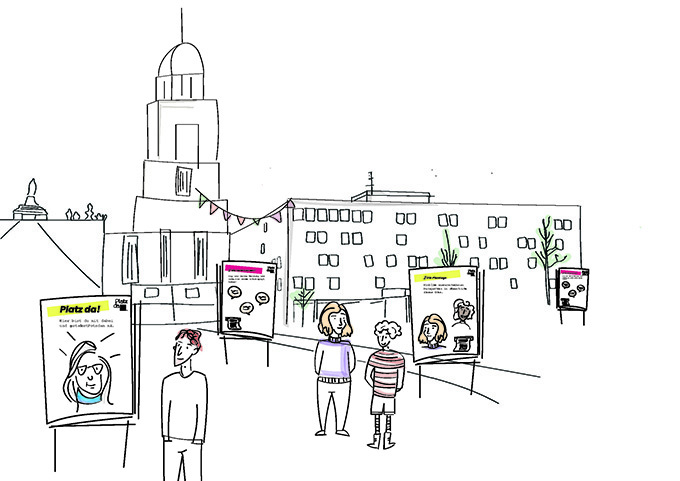Potsdam Becomes Agile - How Design Thinking Makes the City More Innovative
For the past four years, the state capital of Potsdam has been a cooperation partner of HPI D-School and, inspired by the Design Thinking approach, is striving for a digital and cultural transformation in administrative work and city politics. HPI D-School students support the necessary modernization and change processes in various projects.
The challenges of digitalization increasingly confront all areas of life and work. We must overcome outdated models of thinking, learning, and working to shape the future more innovatively and creatively. Especially in administrative work, hierarchical organizational structures in separate departments and bureaucratic processes hold up necessary transformations. The city of Potsdam has recognized that something needs to change in this area and has been proactively promoting digital and innovative capacity in city administration and policy for several years.
Despite the willingness for change, implementing it alongside the daily workload and without inspiration from outside is often challenging. That's why the HPI D-School is helping the capital of Brandenburg to think anew with the help of Design Thinking. In this process, the city establishes digitization, innovation, and New Work principles in its administrative work.
The start of a long-standing cooperation
In 2019, we welcomed the mayor of the city of Potsdam, Mike Schubert, to the HPI D-School. During his visit and discussions with Prof. Uli Weinberg, he recognized the potential of Design Thinking and the opportunity to apply the innovative approach to the city administration.
Since then, our students have been involved in various projects to develop innovation in the city of Potsdam. In the process, internal administrative processes have been restructured, the transfer of knowledge and expertise has been strengthened, and opportunities for citizen participation have been created.
The goal is to make the city of Potsdam fit for the future through agile and creative methods. In this successive innovation process, projects such as developing a digital platform to distribute daycare places by HPI D-School students are only the beginning of ongoing cooperation.
Prof. Uli Weinberg, Director of HPI D-School, sees great potential in applying Design Thinking methods within the city's internal modernization processes: "Design thinking not only helps companies and organizations on the path to digital transformation, municipalities and administrations can also benefit from the innovation potential. That's why we are particularly pleased that the city of Potsdam is playing pioneer here and breaking new ground!"
Smart City Potsdam
"Smart City Potsdam - Innovative. Green. Just. Together we are creating a sustainable city for tomorrow!": To become even more future-proof, Potsdam applied to become a Smart City model project under this motto in March 2021. In July 2021, the Federal Ministry of the Interior and Community (BMI) approved the funding application and named Potsdam a "Smart City Model Municipality."
The City of Potsdam aims to improve the quality of life for its citizens. These should also live in a social and sustainable city in the future. The funding investment aims to create strategies to strengthen digitalization and combat the climate crisis.
The planned projects include a "Potsdam Lab" concept, which was also developed as part of a project with the HPI D-School. Openlab Stockholm inspired this local lab as a place for innovation and design to solve societal challenges in cooperation and strengthen the sustainable growth of the city of Stockholm.
As an innovation center and physical space in the center of Potsdam for exchange and interdisciplinary collaboration, the Potsdam Lab will bring together the city administration and politics, citizens, experts from culture and science, and students. Together, they will address challenges facing the city of Potsdam in an innovative environment and rethink urban development and administration with the help of Design Thinking methods.
Compromise for a long-standing conflict
In the summer of 2021, the city of Potsdam presented a team of students from the HPI D-School with another difficult challenge. It was about developing a new concept for the future use of the area around the historic landmarks "Plantage," "Rechenzentrum," and Garnisonkirche in downtown Potsdam, which has been at the center of a ten-year conflict.
A Design Thinking co-creation process brought all stakeholders to the table and led to a compromise for the future joint use of the area. Potsdam's city councilors have now decided to implement the "Platz da" usage concept as a "Forum an der Plantage" with the Garnison Church tower, the "Rechenzentrum" and a connecting "House of Democracy." All parties involved support this innovative concept. Even German President Frank-Walter Steinmeier publicly welcomed the compromise.
The HPI School of Design Thinking thanks the city of Potsdam and looks forward to collaborating on further innovation projects for digital and cultural transformation in city administration and politics.

